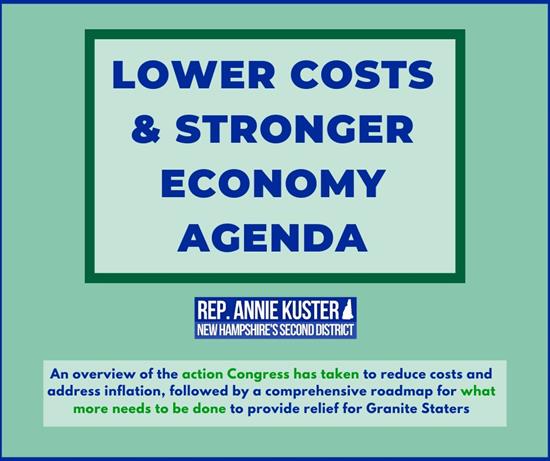Press Releases
Kuster Unveils Lower Costs & Stronger Economy Agenda
Concord, N.H.,
September 12, 2022
Today, Rep. Annie Kuster (NH-02) unveiled her “Lower Costs & Stronger Economy” Agenda, which outlines the actions Congress has taken to reduce costs and address inflation, as well as a comprehensive roadmap for what more needs to be done to provide relief for Granite Staters. “We have taken critical steps to lower prices in the short-term and reduce inflation over the long-term by investing in our supply chains, reducing out-of-pocket costs in health care, releasing millions of barrels of oil from our strategic reserves, and repairing and rebuilding our roads, ports, and bridges. But we can’t stop here, and we won’t,” said Kuster. “My agenda outlines steps we have already taken to lower costs for Granite Staters and strengthen our economy and outlines additional actions that should be taken to address inflation further. I am committed to continuing working with my colleagues on both sides of the aisle to meet the challenges our country faces head-on by providing relief to Granite Staters and investing in U.S. economic resilience, competitiveness, and innovation. That is exactly what I will work to deliver.” Specifically, Kuster’s agenda covers: Steps That Congress Has Taken to Lower Prices Rapidly improved supply chains: The CHIPS and Science Act invests $52 billion to spur American manufacturing, supply chains, and national security, and invest in research and development through the National Science Foundation, establish regional tech hubs to create jobs and spur innovation in new parts of the country, grow our STEM workforce, and expand American-made 5G technology. Brought more people into the workforce: Our historic economic recovery created millions of good jobs at a rapid pace. In fact, the U.S. now has two job openings for every unemployed person. This job growth led to increased earnings for many; however, the tight labor market also created challenges in ramping up the supply of goods and services to meet high, post-pandemic demand. Strengthened American energy security to lower energy costs: As the economy continues to reopen and Americans travel more, energy demand is outpacing supply. Russia’s unjust invasion of Ukraine upended the global oil market and exacerbated rising prices at the pump. The actions in the agenda address gas and energy prices and secure America’s energy independence. Invested in American agriculture to lower food prices: Global supply chain challenges, Russia’s war on Ukraine, lack of competition in several agricultural sectors, and fertilizer prices that have more than doubled over the past year have all contributed to the inflation American families see at the supermarket. Cut costs by reducing trade barriers: In Congress, we have taken actions to cut costs for American families and manufacturers by rolling back Trump-era tariffs and other costly trade policies. Expanded access to affordable high-speed internet: High-speed internet is necessary for Americans to do their jobs, participate in school, access health care, and stay connected. Under the American Rescue Plan Act, New Hampshire received $122 million to connect more than 24,000 homes and businesses to affordable, high-speed internet through the Capital Projects Fund. Reduced out-of-pocket costs for Granite Staters: The Inflation Reduction Act will lower health care costs for millions of Americans and put money back in the pockets of American families and seniors. This law caps prescription drug costs for hundreds of thousands of New Hampshire Medicare beneficiaries, reduces health insurance premiums for tens of thousands of Granite Staters by about $720 per year on average while expanding coverage to about 11,000 Granite Staters, and caps the insulin copayments for thousands of New Hampshire Medicare beneficiaries.
The Plan to Address Inflation Further Fill gaps in the workforce: Updating American workforce development programs and immigration policies and increasing the availability and affordability of childcare can help address labor market shortages. In New Hampshire, we are currently experiencing historically low unemployment, exacerbated by the COVID-19 pandemic which resulted in one in ten women quitting a job. The policies outlined in the agenda will better prepare people entering the workforce, upskill those in their careers, retrain dislocated workers, and increase the labor supply. Suspend and reduce tariffs and other trade barriers: We must reduce barriers to trade that increase costs for American consumers and manufacturers, relax overly restrictive regulations in order to keep costs low while supporting American workers, and engage with allies and close trading partners to increase economic cooperation and pursue trade agreements to further secure global supply chains. Increase the supply of affordable housing: The lack of affordable housing and workforce crisis go hand-in-hand. Rep. Kuster pushed the Treasury Department to make American Rescue Plan funds available for affordable housing. This Agenda outlines what else can be done. Lower the price of food: Inflation is impacting food prices everywhere. Policies to spur more competition and fairer prices for Granite State farmers in food processing and distribution can help to lower the price of food in our communities. This agenda also includes extending cost-saving American Rescue Plan nutrition assistance and flexibility, including enhanced Supplemental Nutrition Assistance Plan (SNAP) benefits. Invest in the long-term fiscal strength of our nation and families: This roadmap was assembled with the knowledge that we must make responsible decisions so we can continue to afford critical investments in our future in mind. By cutting wasteful spending, streamlining duplicative programs, and finding inefficiencies throughout government, we can reduce the deficit in a balanced way that protects priorities such as education, research, and health care. Lower energy prices and transition to a clean energy economy: We have made progress, but more can be done as we work to lower costs and transition to a clean energy economy, including continuing to release oil from the Strategic Petroleum Reserve, easing market and regulatory barriers to innovation and deployment of climate technologies, and passing the 21st Century Dams Act to invest in hydropower. ### |


